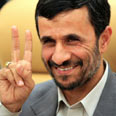
'Arab states concerned new US report will strengthen Iran'
Los Angeles Times article reports moderate Arab states worried about consequences of US intelligence assessment that Tehran froze its nuclear weapons program in 2003. Main concern is that less US pressure on Iran will encourage Islamic state to meddle in other countries affairs, expand support for terrorism
According to the report, even though Saudi Arabia and other Arab states oppose an American strike on Iran's nuclear installations, they had been pleased with the state of unease a possible attack has kept the Iranian leadership under. These nations are now concerned that Iran will seize on the fading US pressure as an opportunity to increase their influence in areas such as Lebanon, Syria, the Palestinians territories and other Persian Gulf states.
The Times article stated that a new US intelligence assessment has not quelled the Arab states' fear of Iranian nuclear ambitions because Tehran is openly continuing its uranium enrichment efforts.
"There's no trust on the Arab side about Iran's intentions," said Christian Koch, research director for international studies at the Gulf Research Center in Dubai, United Arab Emirates.
"There are concerns of Iran's nuclear program for military purposes. There are concerns about Iran's influence in Iraq, over the unsettled political situation in Lebanon and over the dispute regarding Abu Musa, Greater and Lesser Tunb (three gulf islands in Iran's control that are claimed by the United Arab Emirates)," he continued.
Moderate Arab states are alarmed, among other things, about the popularity of Iranian president Mahmoud Ahmadenijad on the Arab street because of what is perceived as his defiant behavior in his dealings with United States and the West.
Analysts in the Arab world believe that this US intelligence report may signal a change in US attitudes towards Iran and could be a harbinger of moderation of the aggressive war rhetoric the US has used vis-à-vis Iran in the past.
The new assessment is seen by some in the Arab world as another sign of American weakness in the Middle East following its perceived failure to stabilize Iraq and its meager involvement in the Israeli-Palestinian peace process in the last seven yeas.
"This report is a face-saving device for the US. It gives the US administration a subtle way to backtrack on their stance regarding the Iranian nuclear issues," said Amal Saad-Ghorayeb, a visiting scholar at the Carnegie Endowment Middle East Center in Beirut. "What we are seeing is not a change in the US strategy of reshaping the Middle East, but rather a change of tactics."
"There is no doubt that following this report, Iran will feel more at ease," said Habib Fayyad, a Beirut-based political analyst and expert on Iran. "First, it will drive Moscow and Beijing to disregard calls for sanctions against Iran. There will be more division within the EU regarding Iran's nuclear program, and it will fortify Iran's negotiating posture in Iraq. In Lebanon, Iran's allies (Hizbullah) will be more confident in asking for a bigger political role."










